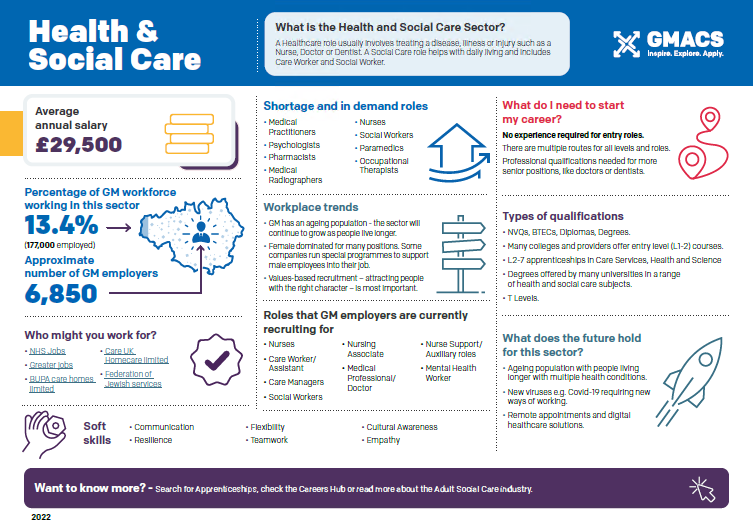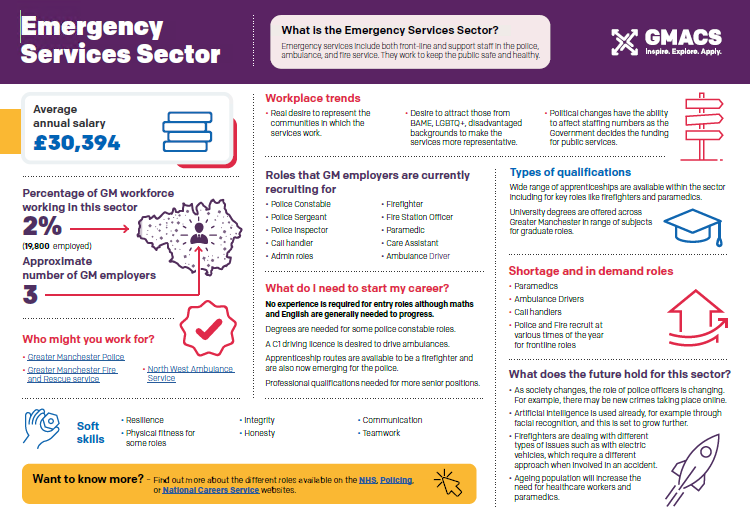If you’re a hard-working team player who’s passionate about making a real difference to people’s lives, then a career in the healthcare sector could be for you.
It’s a traditionally popular career choice but following the Covid-19 pandemic there has been even greater recognition for the essential role of our healthcare professionals, who came even more to the fore for selflessly and continually helping those in need.
With a huge range of rewarding career paths, structured training and development opportunities, together with high demand that’s only set to grow as our population increases, it’s no surprise that healthcare is a great career route for many.
Featured Stockport Employer
Hear from Simon and Lindsey at Stockport NHS Foundation Trust discussing careers within the Healthcare sector. Stockport NHS Foundation Trust’s main hospital is Stepping Hill, which looks after a population of approximately 350,000 people. Stepping Hill Hospital first opened in 1905 and was a military hospital during the first World War. They are one of our borough’s largest employers with over 5,000 staff and were one of the first NHS trusts in the country to achieve foundation trust status in 2004.
Find out about Nursing Development and Career Pathways, including the Nursing Cadet Programme, Band 1 Apprenticeships, Band 2 Health Care Assistant and Band 3 Health Care Assistant certificates, as well as foundation and degree programmes.
Labour Market Information
Now more than ever, the healthcare industry is recognised an essential part of the UK’s public service provision and economy and this growth is only set to continue. With a strong jobs outlook, there are many reasons to invest in developing your career or transferring your skills to a career in health.
The NHS employs 1.5 million people and has over 350 different career paths – placing it in the top five largest workforces in the world. It employs people in a broad range of sectors – from estates management to physiotherapy, catering to clinical science – so there’s more to careers with the NHS than just nurses and doctors.
Healthcare jobs in Stockport could include working for Stockport NHS Foundation Trust, with their main hospital site based at Stepping Hill in Hazel Grove including a dedicated education and training centre, Pinewood House. They’re Stockport’s second largest employer, with over 5,000 medical and non-medical staff.
However, there’s also a huge growth in dependent healthcare organisations, both private sector and voluntary and non-profit organisations too. You could therefore work in a range of settings including care homes or hospices, in the community (such as a doctors, dentist or clinic), a medical laboratory or people’s own homes.
Starting Salary
£12-13 per hour or £18,000
per annum
Typical Salary Range
£21,000 – £96,000+
per annum
Working Hours
37 to 40 hours per week, usually working shifts to deliver 24/7 care

LMI Infographic from GMACS
GMACS have produced a range of helpful infographics to summarise careers in the Healthcare & Emergency Services sectors and the current employment landscape in Greater Manchester.
According to the stats in Health & Social Care, the most in-demand roles are as a Nurse, Social Worker, Paramedic and Pharmacist and you may find yourself working for one of 6,850 healthcare employers such as NHS, BUPA, in the public sector integrated services or for Care UK for example. You’ll be joining 13.4% of GM residents who work in this sector earning an average of £29,500 and you’ll need to demonstrate communication skills, resilience, flexibility and teamwork.
You can view the full infographic and click on the links for more information by selecting the button below to view as a PDF.
In the emergency services sector in GM, there are 3 main employers – GM Police, GM Fire & Rescue and North West Ambulance Service who between them employ 19,800 residents. The most in-demand roles are for frontline roles within the police and fire services, as well as ambulance drivers and call handlers.
To succeed in this sector, you’ll need resilience, integrity and physical fitness for some roles. There’s a wide range of apprenticeships available for key roles like firefighters and paramedics, as well as university degrees that may be required for some police constable roles for example.
You can view the full infographic and click on the links for more information by selecting the button below to view as a PDF.
























